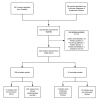Citation bias in otolaryngology systematic reviews
- PMID: 33424465
- PMCID: PMC7772969
- DOI: 10.5195/jmla.2021.736
Citation bias in otolaryngology systematic reviews
Abstract
Objective: Reproducibility of systemic reviews (SRs) can be hindered by the presence of citation bias. Citation bias may occur when authors of SRs conduct hand-searches of included study reference lists to identify additional studies. Such a practice may lead to exaggerated SR summary effects. The purpose of this paper is to examine the prevalence of hand-searching reference lists in otolaryngology SRs.
Methods: The authors searched for systematic reviews published in eight clinical otolaryngology journals using the Cochrane Library and PubMed, with the date parameter of January 1, 2008, to December 31, 2017. Two independent authors worked separately to extract data from each SR for the following elements: whether reference lists were hand-searched, other kinds of supplemental searching, PRISMA adherence, and funding source. Following extraction, the investigators met to review discrepancies and achieve consensus.
Results: A total of 539 systemic reviews, 502 from clinical journals and 37 from the Cochrane library, were identified. Of those SRs, 72.4% (390/539) hand-searched reference lists, including 97.3% (36/37) of Cochrane reviews. For 228 (58.5%) of the SRs that hand-searched reference lists, no other supplemental search (e.g., search of trial registries) was conducted.
Conclusions: These findings indicate that hand-searching reference lists is a common practice in otolaryngology SRs. Moreover, a majority of studies at risk of citation bias did not attempt to mitigate the bias by conducting additional supplemental searches. The implication is that summary effects in otolaryngology systematic reviews may be biased toward statistically significant findings.
Copyright © 2021 Matt Vassar, Austin L. Johnson, Adriana Sharp, Cole Wayant.
Figures
Similar articles
-
Manual search approaches used by systematic reviewers in dermatology.J Med Libr Assoc. 2016 Oct;104(4):302-304. doi: 10.3163/1536-5050.104.4.009. J Med Libr Assoc. 2016. PMID: 27822152 Free PMC article.
-
Methodological Quality of Systematic Reviews and Meta-analyses Published in High-Impact Otolaryngology Journals.Otolaryngol Head Neck Surg. 2020 Nov;163(5):892-905. doi: 10.1177/0194599820924621. Epub 2020 May 26. Otolaryngol Head Neck Surg. 2020. PMID: 32450783
-
Search strategies in systematic reviews in periodontology and implant dentistry.J Clin Periodontol. 2013 Sep;40(9):883-8. doi: 10.1111/jcpe.12132. Epub 2013 Jul 3. J Clin Periodontol. 2013. PMID: 23834263
-
Few systematic reviews exist documenting the extent of bias: a systematic review.J Clin Epidemiol. 2008 May;61(5):422-34. doi: 10.1016/j.jclinepi.2007.10.017. J Clin Epidemiol. 2008. PMID: 18394534 Review.
-
Trial Registry Searches in Plastic Surgery Systematic Reviews: A Meta-epidemiological Study.J Surg Res. 2023 Aug;288:21-27. doi: 10.1016/j.jss.2023.02.022. Epub 2023 Mar 20. J Surg Res. 2023. PMID: 36948029 Review.
Cited by
-
Sensor technology to monitor health, well-being and movement among healthcare personnel at workplace: a systematic scoping review protocol.BMJ Open. 2021 Nov 11;11(11):e054408. doi: 10.1136/bmjopen-2021-054408. BMJ Open. 2021. PMID: 34764179 Free PMC article.
-
Measured and perceived impacts of evidence-based leadership in nursing: a mixed-methods systematic review protocol.BMJ Open. 2021 Oct 22;11(10):e055356. doi: 10.1136/bmjopen-2021-055356. BMJ Open. 2021. PMID: 34686559 Free PMC article.
References
-
- Higgins JPT, Green S, ed. Cochrane handbook for systematic reviews of interventions: online version (5.1.0, Mar 2011) [Internet] Cochrane Collaboration; 2011. [cited 1 Oct 2020]. <https://handbook-5-1.cochrane.org/>.
-
- Guyatt G, Oxman AD, Akl EA, Kunz R, Vist G, Brozek J, Norris S, Falck-Ytter Y, Glasziou P, DeBeer H, Jaeschke R, Rind D, Meerpohl J, Dahm P, Schünemann HJ. GRADE guidelines: 1. introduction-GRADE evidence profiles and summary of findings tables. J Clin Epidemiol. 2011. April;64(4):383–94. - PubMed
-
- Lefebvre C, Glanville J, Briscoe S, Littlewood A, Marshall C, Metzendorf MI, Noel-Storr A, Rader T, Shokraneh F, Thomas J, Wieland S. Searching for and selecting studies In: Higgins J, Thomas J, eds. Cochrane handbook for systematic reviews of interventions Cochrane Collaboration; 2019.
-
- Sterne J, Egger M, Moher D. 10.2.2.3 Citation bias In: Higgins JPT, Green S, ed. Cochrane handbook for systematic reviews of interventions. Version 5.1.0. Cochrane Collaboration; 2011.
MeSH terms
LinkOut - more resources
Full Text Sources
Other Literature Sources
Research Materials
Miscellaneous

